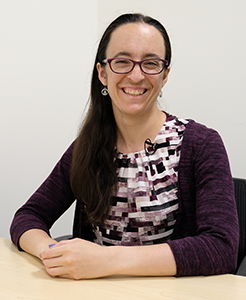Graduate Seminar Series
October 07, 2022
12:20 p.m. ET
Porter Hall - Room 100
October 07, 2022
12:20 p.m. ET
Porter Hall - Room 100
Polymer networks are a key component of many engineering materials, and understanding how the molecular-scale structure of such networks impacts their response to force is critical for developing materials with improved properties. In this talk, I will describe two aspects of our group's work on understanding how network structure and topology impact force transmission in polymer networks. First, I will discuss how crosslink heterogeneity impacts the behavior of polymer networks at high strain. We synthesize and characterize a series of randomly- and regularly-crosslinked networks, and using a double network strategy, access extension ratios of 20 or more. We find that the regularly-crosslinked networks exhibit a significantly higher strain at break and a delayed onset of strain hardening than do random networks, even when their moduli at low strain are the same. I will then describe how force-responsive chemical units, or mechanohophores, can be used to investigate the molecular- scale forces at play. Finally, I will discuss extension of this work to more complex polymeric materials, with a focus on nanostructured morphologies formed by self- assembly of triblock copolymers containing a mechanophore in the middle of the rubbery midblock. Using a combination of experiments and coarse-grained molecular dynamics simulations, we show that transmission of macroscopic forces to the midblock is strongly dependent on the network topology, with tie chains bearing the majority of the stress; manipulation of both the self-assembled morphology and the molecular weight distributions of polymers can thus be used to direct the force distributions at the molecular scale. Together, these efforts provide new insights into the molecular-scale response of networks to applied force, and offer new pathways to materials with tailored mechanical and mechanochemical properties.
 Jennifer Laaser received her Ph.D in 2013 from the University of Wisconsin- Madison, where she worked with Martin Zanni to develop new methods in ultrafast spectroscopy for investigating the structure and dynamics of molecules at interfaces. After leaving UW-Madison, she was a postdoctoral associate at the University of Minnesota, where she worked with Timothy Lodge to develop a detailed understanding of micelle-based polyelectrolyte complexes for gene delivery applications. She joined the faculty at the University of Pittsburgh in August 2016, where her research program focuses on the physical chemistry of charged and ion-containing polymers, and on mechanochemistry in polymer networks. She received an NSF CAREER award to support this work in 2018. Outside of her research, Prof. Laaser has a strong interest in teaching and outreach, and is currently developing a freely-available guided inquiry curriculum for undergraduate courses in polymer science.
Jennifer Laaser received her Ph.D in 2013 from the University of Wisconsin- Madison, where she worked with Martin Zanni to develop new methods in ultrafast spectroscopy for investigating the structure and dynamics of molecules at interfaces. After leaving UW-Madison, she was a postdoctoral associate at the University of Minnesota, where she worked with Timothy Lodge to develop a detailed understanding of micelle-based polyelectrolyte complexes for gene delivery applications. She joined the faculty at the University of Pittsburgh in August 2016, where her research program focuses on the physical chemistry of charged and ion-containing polymers, and on mechanochemistry in polymer networks. She received an NSF CAREER award to support this work in 2018. Outside of her research, Prof. Laaser has a strong interest in teaching and outreach, and is currently developing a freely-available guided inquiry curriculum for undergraduate courses in polymer science.
November 4 2025
7:00 AM ET
US locations
November 4 2025
9:00 AM ET
Materials Science and Engineering
M.S. Program Information Session
Join us online to learn more about becoming part of the graduate student community through our master's degree programs.
Virtual
November 5 2025
4:00 PM ET
Materials Science and Engineering
"What Materials Research Looks Like At Apple,” presented by Carolyn Duran
Doherty A303
November 7 2025
12:45 PM ET
Materials Science and Engineering
Adventures in additive manufacturing for space exploration, presented by Daniel Oropeza, University of California Santa Barbara
7500 Wean Hall
November 11 2025
11:00 AM ET
Materials Science and Engineering
"Behind the Scenes with an ACS Editor: Insights into Scholarly Publishing and Manuscript Preparation,” presented by Dr. Raymond Schaak
5201 Scott Hall
November 13 2025
4:30 PM - 6:30 PM ET
Roberts Engineering Hall, Singleton Room, 4th floor